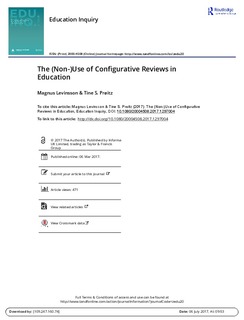| dc.contributor.author | Levinsson, Magnus | |
| dc.contributor.author | Prøitz, Tine Sophie | |
| dc.date.accessioned | 2017-07-06T17:00:20Z | |
| dc.date.available | 2017-07-06T17:00:20Z | |
| dc.date.created | 2017-07-05T20:44:32Z | |
| dc.date.issued | 2017 | |
| dc.identifier.citation | Education Inquiry, 2017 | nb_NO |
| dc.identifier.issn | 2000-4508 | |
| dc.identifier.uri | http://hdl.handle.net/11250/2448139 | |
| dc.description.abstract | The push for evidence-based practice in education has led to a range of initiatives aimed at bridging the gap between research, policy and practice. Among these are the establishment of brokerage agencies with a mission to synthesise the findings of educational research. This development has been the subject of extensive controversy over the last decades. Critics emphasise that brokerage agencies in most fields prioritise experimental designs that measure the impact of interventions. However, the use of different methods for systematic reviews has increased over the last decade. In education, this development has included a growing interest in configurative reviews. Configurative approaches have been promoted as suitable for synthesising complex bodies of research and for pursuing questions that go beyond what works. This study explores the use of configurative reviews in two brokerage agencies that acknowledge the need to work with different kinds of reviews in education. However, the overall result shows that configurative reviews are rarely used. Less distinctive configurative elements can be identified in many reviews, but generally they operate within the frame of the conventional methodology and tend to be subordinated to an aggregative logic. These findings are discussed as threats to the relevance and quality of systematic reviewing in education. | nb_NO |
| dc.language.iso | eng | nb_NO |
| dc.rights | Navngivelse 4.0 Internasjonal | * |
| dc.rights.uri | http://creativecommons.org/licenses/by/4.0/deed.no | * |
| dc.title | The (Non-)Use of Configurative Reviews in Education | nb_NO |
| dc.type | Journal article | nb_NO |
| dc.type | Peer reviewed | nb_NO |
| dc.description.version | publishedVersion | nb_NO |
| dc.source.journal | Education Inquiry | nb_NO |
| dc.identifier.doi | 10.1080/20004508.2017.1297004 | |
| dc.identifier.cristin | 1481091 | |
| cristin.unitcode | 222,80,6,0 | |
| cristin.unitname | Institutt for pedagogikk og skoleutvikling | |
| cristin.ispublished | true | |
| cristin.fulltext | original | |
| cristin.qualitycode | 1 | |

